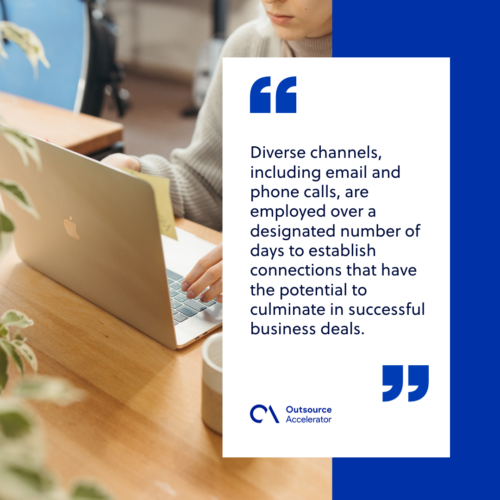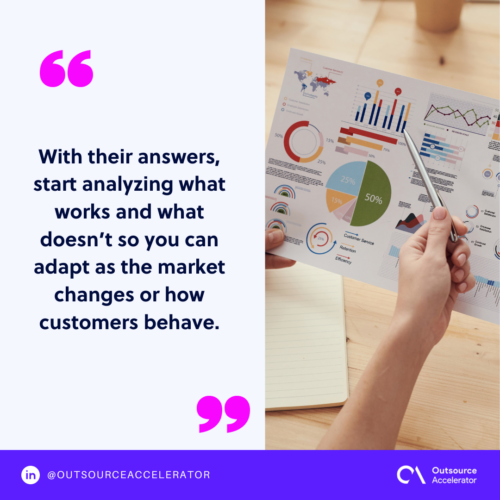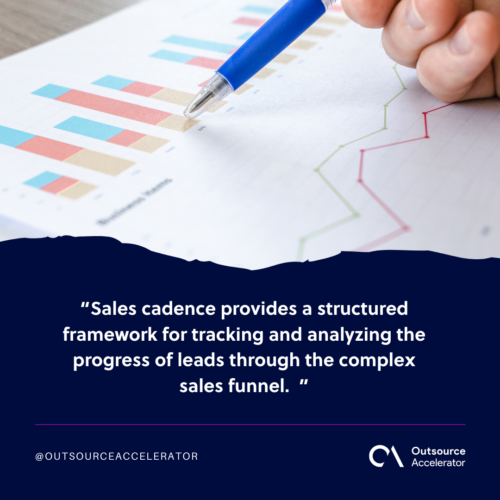Elevate your sales strategy through sales cadence

Sales cadence can be comparable to choreographed dancing. But instead of moving your body, it’s how you talk to people—quite literally structured conversations.
In the business world, it is one technique that can help revolutionize business relationships and elevate sales.
Learn how an impeccably designed sales cadence can guarantee the effective nurturing of prospects, leading to elevated conversion rates and heightened customer satisfaction.
What is sales cadence?
A sales cadence increases your sales numbers. It’s a sequence of outreach attempts for salespeople to better connect with their prospects.
Diverse channels, including email and phone calls, are employed over a designated number of days to establish connections that have the potential to culminate in successful business deals.

2 types of sales cadences
Sales cadence assumes various forms, depending on the direction of communication:
Inbound sales cadence
An inbound sales cadence revolves around engaging leads who have already shown interest in the business.
This type of cadence emphasizes providing valuable content, addressing inquiries promptly, and nurturing leads throughout their decision-making journey.
Outbound sales cadence
In contrast, an outbound sales cadence focuses on proactively reaching out to potential customers who have yet to express interest.
It encompasses assertive outreach methods such as personalized emails, persuasive calls, and compelling social media messages.
Outbound sales cadence aims to ignite brand awareness, generate interest, and initiate meaningful conversations with prospects.
Steps in sales cadence planning
Developing an effective sales cadence involves several critical steps:
1. Determine your target audience
Thoroughly identify your ideal customers while gaining profound insights into their pain points and preferences. Tailor your cadences meticulously to align harmoniously with their specific needs and interests.
2. Craft a flawless cadence structure
Carefully determine the ideal frequency and types of touchpoints that will yield optimal results. You can utilize:
- Captivating emails
- Persuasive phone calls
- Engaging social media interactions
- Immersive webinars
These activities can help you strike a balance between persistence and respecting the prospect’s personal space.
3. Weave captivating content
Create captivating and informative content that seamlessly aligns with each touchpoint along your sales cadence. It ensures that every interaction provides value and keeps potential customers engaged throughout the journey.
4. Harness the power of automation
Sales automation tools have made it simple to schedule emails, follow-ups, and other tasks that normally take hours.
The best part is that it doesn’t just save time — it also improves the quality by guaranteeing consistency.
5. Monitor and analyze with precision
Using tracking mechanisms, you can better understand engagement levels and response rates at every stage of your sales journey.
This will allow you to make smarter adjustments that will generate more leads.
6. Iterate and improve
Ask your team how they’re doing. With their answers, start analyzing what works and what doesn’t so you can adapt as the market changes or how customers behave.

How important is sales cadence in today’s business environment?
Sales cadence propels businesses to keep up with the pace in a quickly changing business environment, especially in today’s world, where time is of the essence.
A well-crafted sales cadence outreach provides the following advantages:
1. Refined sales process
Sales cadence allows businesses to polish their sales processes.
By defining distinct stages and touchpoints, sales teams can maintain consistency and efficiency throughout their interactions with potential customers.
This structured approach leads to a more polished and refined selling methodology. It guarantees a more efficient sales process for all parties involved by removing the burden of time-consuming exchanges that are fruitless.
2. Scalability
A well-structured sales cadence provides an agile framework for businesses to scale their operations effortlessly.
With automated touchpoints, organizations can effectively manage an ever-increasing number of leads without compromising on engagement quality.
Scalability ensures that businesses can handle larger volumes of prospects without breaking a sweat.
3. Enhanced engagement
Engagement serves as the driving force behind successful sales endeavors.
A thoughtfully crafted sales cadence guarantees personalized and timely communication for potential customers.
Tailoring interactions based on prospect behavior and preferences allows businesses to enhance engagement levels significantly.
It fosters stronger relationships with their target audience.
4. Improved brand awareness
Consistent and meaningful interactions through a well-defined sales cadence significantly elevate brand awareness.
Businesses establish themselves as industry experts by delivering valuable content and solutions at precisely the right moments, enhancing their brand reputation and credibility.
Additionally, sales cadence allows companies to effectively serve a wider consumer base without sacrificing quality.
It is equivalent to providing excellent service to many guests without scorching the chicken tenders or creating a dish that tastes like paper.
5. Progress tracking and analysis made simple
Sales cadence provides a structured framework for tracking and analyzing the progress of leads through the complex sales funnel.
By diligently monitoring the effectiveness of different touchpoints, sales teams can identify what works best and make data-driven adjustments to their cadences.
This data-centric approach fosters continuous improvement and leads to higher conversion rates.

How to choose the right sales cadence tools
When selecting a sales cadence tool for your team, consider the following factors:
User-Friendly Interface
A user-friendly interface enhances productivity by simplifying the sales cadence process, allowing your sales team to focus on generating leads and closing deals rather than navigating complex tools.
Automation Capabilities
Look for tools with advanced automation to streamline tasks, enabling sales reps to build relationships and close deals. Consider integration with the sales pipeline for seamless workflow and lead tracking.
Customization Options
To choose good sales cadence tools for your organization, prioritize customization options to tailor the tool to suit your unique sales and marketing efforts.
The software’s effectiveness in streamlining sales outreach is being evaluated through its automation of tasks, which saves time and increases productivity.
The integration capabilities with outreach and marketing tools are also being analyzed to ensure seamless communication and tracking across all platforms.
Reporting and Analytics
Some of the best sales cadence tools provide detailed reporting, helping you track your team’s performance and sales goal progress.
These tools give insights into sales efforts, helping make data-driven decisions & optimize strategies for better results.
As you create a sales cadence for your organization, make sure the chosen tools can support your structure and automate tasks for a smoother sales process.
Sales cadence: Revolutionizing the future of businesses
When companies speak to their audience, they want them to listen. Sales cadence helps this become a reality. On top of creating connections with leads, it also reshaped how we do business today.
The art of selling has become similar to a dance routine. If done right, it can captivate potential customers while building meaningful relationships.
But like a well-rehearsed dance, there’s no one-size-fits-all approach— it’s about being able to adapt at any given moment.
To succeed, businesses must be able to communicate the right message at the right time and approach individual preferences.
Sales cadence enables brands to build customer relationships and loyalty and establish themselves as trustworthy partners in their respective markets.







 Independent
Independent




